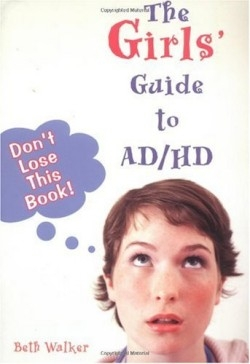
The Girls' Guide to AD/HD
Don't Lose This Book!
Having Attention-Deficit/Hyperactivity Disorder (AD/HD) is not a girl’s fault, but it is her problem. This accessible book, written specifically for girls in grades six through twelve, presents AD/HD as something to deal with, not to be ashamed of.
AD/HD is a neurological disorder affecting between six and nine percent of all Americans. According to the author, girls with the disorder behave differently than boys who have it. Girls are more likely to fidget rather than run around, and to whisper to a classmate rather than yell out. They are more likely to be day-dreamy in their distraction and get depressed instead of angry with people who don’t understand that they are not lazy or unfocused.
The first-time author, who is the mother of a girl with AD/HD, narrates her book in the voice and mannerism of a teenage girl named Maddy (and her friends Bo and Helen, who also have AD/HD). Walker has captured the essence of teen speech, while providing research-based information. “People with AD/HD don’t focus or pay attention the way other people do,” says Maddy. “I pay attention. It just isn’t always what I’m supposed to be paying attention to.”
As Maddy, she often goes off track, which is a wonderful way to demonstrate how the mind of someone affected by AD/HD works. She never strays too far, though, and keeps her discussions short so that her attention-challenged audience can stay with her. Graphics, varied fonts, and bold headlines maintain visual interest.
The book follows a safe, logical progression. Walker starts with general facts about the disorder, including the chemistry of the teenaged brain and various treatments; then she carefully makes the conversation more personal by delving into how AD/HD affects family dynamics, friendships, school, and romances. Since AD/HD is not recognized in many girls, they often develop self-esteem problems by the time they are teens. Girls with AD/HD can also have trouble sustaining friendships, adding to their potential depression. They are often late, interrupt a lot, aren’t very good listeners, and have trouble picking up social cues. The author gives specific suggestions for how to make (and keep) friends.
AD/HD in girls is severely under-diagnosed. Some researchers estimate that as many as seventy-five percent of girls with AD/HD aren’t diagnosed. As more educators, parents, and girls become more aware of it, they will need books like this one, which offers hope, humor, and the latest research to help girls feel good about who they are.
Throughout the volume, Walker reminds her readers that there are benefits to having AD/HD, including deeper empathy, charm, energy, and lots of great ideas. Maddy will feel like new friend to readers, one who will like them, not in spite of their AD/HD, but because of it.
Reviewed by
Anna Stewart
Disclosure: This article is not an endorsement, but a review. The publisher of this book provided free copies of the book to have their book reviewed by a professional reviewer. No fee was paid by the publisher for this review. Foreword Reviews only recommends books that we love. Foreword Magazine, Inc. is disclosing this in accordance with the Federal Trade Commission’s 16 CFR, Part 255.
